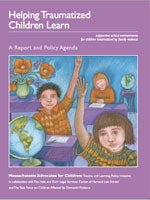Joey Diamond was born in 1994 with cocaine in his system. Two years later, he was found wandering alone in a city park late at night, wearing only a diaper. Custody of the boy was awarded to the same family who had adopted his six older siblings, and for a while he did fine, but in elementary school he began struggling academically and behaviorally, especially after his adoptive father died suddenly of a heart attack.
Joey’s adoptive mother despaired over how to reverse her son’s decline. In 2007, she heard about the Special Education Clinic of the Trauma and Learning Policy Initiative, which could help her negotiate with the local public school system to provide a better placement for her son.
A partnership between Harvard Law School’s WilmerHale Legal Services Center and Massachusetts Advocates for Children, the initiative highlights growing evidence that trauma resulting from family violence and other overwhelming stress can have neurobiological effects on a child’s learning and behavior in the classroom. The program, directed by HLS Lecturer on Law Susan Cole, works with schools and government to create supportive school environments for traumatized students. The program, with Massachusetts Advocates for Children, produced a landmark report and policy agenda for educators and policy makers.
Michelle Kuo ’09 was assigned Joey’s case in the fall of 2007. The goal was to craft a persuasive argument that Joey’s current school was not meeting his needs. According to a school report, Joey had exhibited “aggressive, violent, explosive behavior,” including bullying peers and threatening staff. Even though he was in seventh grade, he hadn’t yet learned to read, and couldn’t effectively count. Yet at home Joey was polite and diffident, and his mother knew he had the aptitude and desire to learn. Kuo started planning for a team meeting with school administrators, lawyers, teachers, a psychological evaluator, and Joey’s mother and pastor to understand Joey’s conflicting behaviors and figure out how to help him. “I felt like a detective, searching through these different stories about my client to make them cohere, so I would have this complex and honest picture of my client that I could then present,” says Kuo. She worked with witnesses to draw out and refine their views, and was ultimately able to persuade school officials to offer Joey a day placement in a therapeutic public school.
As it turned out, Joey’s new school was not a good match; his peer group was a rough one, and Joey felt threatened. He spiraled downward quickly, and had to be placed in a psychiatric hospital twice after trying to throw himself out his bedroom window. Naomi Reed ’09—who took over the case after Kuo finished her clinical stint—marshaled letters from doctors and therapists pinpointing the reasons for Joey’s decline, with the aim of getting the school system to provide a school setting that would address both his therapeutic needs and his frustration with reading. After poring over the case law and evidence, Reed put together a persuasive argument that Joey had suffered from a “pattern of long-term neglect” by the public schools, and she successfully secured an appropriate school placement run by a collaboration of several public school systems for him.
These days Joey is happily ensconced at a school with very small class sizes and a vocational education program. Within a short time he’s learned to read at a first-grade level and is well behaved and polite at school. “He’s settled into a place where he can just be a normal kid, which is exactly what I was hoping for,” says Reed. Meanwhile, Kuo has used what she learned in the clinic to create a program for training psychological evaluators in the intricacies of special education law.
